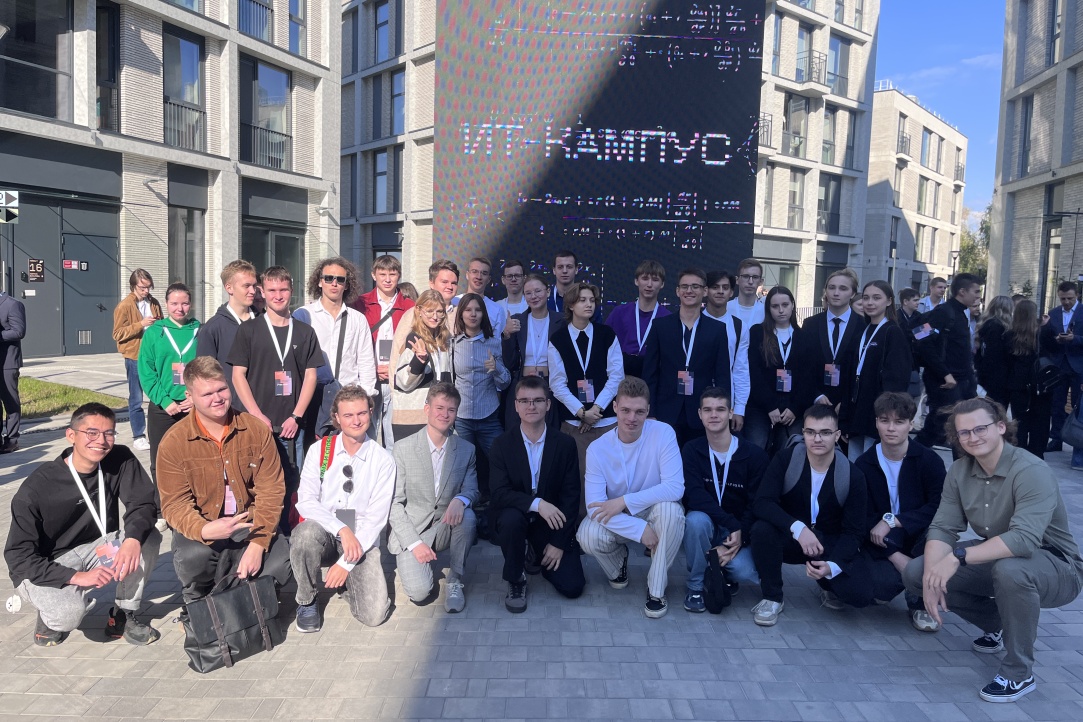
HSE Tops the Ranking of Universities with the Best Employer Reputation
On October 16, 2025, Forbes Education published its list of the top 20 Russian universities with the best employer reputation in 2025. The ranking was based on a survey of leading Russian employers, who named the higher education institutions whose graduates they consider the most well-prepared and are most inclined to hire. HSE University took first place in the ranking.

From Attachés to Speakers: HSE University–Nizhny Novgorod Students Take Part in World Youth Festival Assembly
In September 2025, Nizhny Novgorod became the centre of the international youth movement, hosting around 2,000 participants from 120 regions of Russia and abroad at the World Youth Festival Assembly. Students of HSE University–Nizhny Novgorod’s Foreign Languages and Intercultural Business Communication, Fundamental and Applied Linguistics, and International Bachelor’s in Business and Economics programmes were involved in the event in a variety of roles, from attachés and volunteers to performers and speakers.

Modern Dormitory Complex of NEIMARK IT Campus Opens in Nizhny Novgorod
Almost 200 students of IT programmes at HSE University–Nizhny Novgorod will soon be able to live in modern co-living spaces with all the essentials for living, studying, and working. The complex on Bolshie Ovragi Ulitsa boasts 1,359 places and a dedicated ecosystem for fostering the development of future IT specialists.

“I decided to study what really interests me, and in my case it was philology”
Amaël Renard is a second-year student of “Philology” course, who travelled from Germany to Nizhny Novgorod and got into HSE. After graduating from thirteen years of school, Amael took a break in his education, visiting seventeen countries during that time, and then enrolled in our bachelor's program with little knowledge of Russian. Amael's path was not easy, but now he is successfully juggling philology, working as a tutor, playing sports, and traveling. Amael told us about his experience of university admission and adaptation in a completely new environment.

Hack Summer’25: An Easy Start to Student Life
HSE University in Nizhny Novgorod has hosted Hack Summer, an annual festival for students of the International Bachelor's in Business and Economics. The event helps first-year students learn more about the university and prepare for busy academic life. In addition to the entertainment programme, special attention was paid this year to the development of skills necessary for today’s students.

Applications Open for Student Research Paper Competition 2025
The annual Student Research Paper Competition (SRPC) offers students the chance to showcase their work, such as term papers or theses. It is a valuable opportunity to receive expert feedback and recommendations aimed at improving research, as well as to take the first steps in an academic career. Below we outline the key features and deadlines for submitting entries.

Mathematicians from HSE University–Nizhny Novgorod Solve 57-Year-Old Problem
In 1968, American mathematician Paul Chernoff proposed a theorem that allows for the approximate calculation of operator semigroups, complex but useful mathematical constructions that describe how the states of multiparticle systems change over time. The method is based on a sequence of approximations—steps which make the result increasingly accurate. But until now it was unclear how quickly these steps lead to the result and what exactly influences this speed. This problem has been fully solved for the first time by mathematicians Oleg Galkin and Ivan Remizov from the Nizhny Novgorod campus of HSE University. Their work paves the way for more reliable calculations in various fields of science. The results were published in the Israel Journal of Mathematics (Q1).

From Neural Networks to Stock Markets: Advancing Computer Science Research at HSE University in Nizhny Novgorod
The International Laboratory of Algorithms and Technologies for Network Analysis (LATNA), established in 2011 at HSE University in Nizhny Novgorod, conducts a wide range of fundamental and applied research, including joint projects with large companies: Sberbank, Yandex, and other leaders of the IT industry. The methods developed by the university's researchers not only enrich science, but also make it possible to improve the work of transport companies and conduct medical and genetic research more successfully. HSE News Service discussed work of the laboratory with its head, Professor Valery Kalyagin.

'Science Knows No National Borders'
Foreign scientists successfully continue their work in HSE University laboratories, combining fundamental and applied research to achieve significant results. HSE News Service has spoken to Professor Panos Pardalos, Head of the Laboratory of Algorithms and Technologies for Networks Analysis at HSE University in Nizhny Novgorod, about its work.

‘It’s Thrilling to Have an Opportunity to Discuss Your Scientific Ideas with Interested People’
The International Laboratory of Dynamical Systems and Applications at HSE University–Nizhny Novgorod conducts in-depth theoretical and applied research, including the study of ocean waves, solar corona reconnections, volcanic phenomena, and ship stability. The lab’s researchers, who have received more than 20 significant research grants over the past five years, actively cooperate with Russian and international colleagues from China, Spain, the USA, the UK, Brazil, and other countries. Prof. Olga Pochinka spoke to the HSE News Service about the laboratory’s work.

